Dominic Cummings: Eight takeaways from his interview
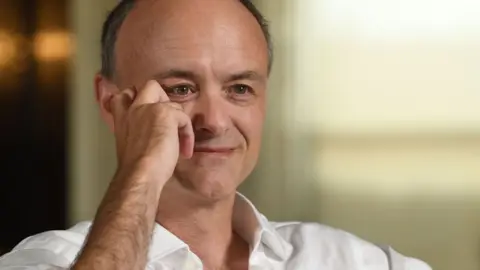 BBC
BBCDominic Cummings has given BBC political editor Laura Kuenssberg his first major TV interview.
So what were the main claims made by the prime minister's former chief aide about his time in Downing Street and running the Vote Leave campaign in the EU referendum?
1) The PM resisted a second lockdown
With Covid rates rising last autumn, there was a debate within government about whether a second lockdown was needed in England.
Mr Cummings says Boris Johnson was highly opposed to new restrictions, which Labour was calling for by mid-October.
He claims the PM sent him a WhatsApp message on 15 October, arguing that most people who were dying were in their 80s.
"That is above life expectancy. So get Covid and Live longer," he allegedly wrote, adding: "And I no longer buy all this NHS overwhelmed stuff. Folks, I think we may need to recalibrate."
But the government says it has taken the "necessary action to protect lives and livelihoods, guided by the best scientific advice" throughout the pandemic.

Dominic Cummings: The Interview is available on BBC iPlayer and BBC Sounds

2) Boris Johnson wanted to keep seeing the Queen in person
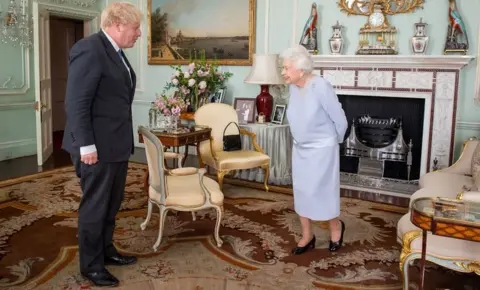 PA Media
PA MediaEarly in the pandemic, according to Mr Cummings, Mr Johnson wanted to keep going to his weekly one-to-one meetings with the Queen in person.
But, on 18 March last year, he adds, Mr Cummings warned the PM that the then 93-year-old monarch would be at risk of dying if she caught coronavirus.
"That's completely insane," he says he told Mr Johnson, who, he adds, then changed his mind.
Downing Street denies that this incident took place.
3) Cummings didn't tell the full story about his County Durham trip
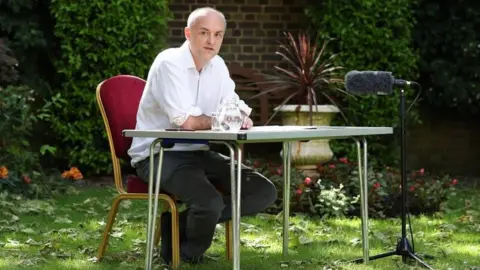 PA Media
PA MediaAfter his road trip to County Durham during lockdown last year was exposed, Mr Cummings faced the media in the Downing Street rose garden. He said he had made the journey to his parents' farm after his wife fell ill.
But he tells the BBC, there were also "security concerns" surrounding his family home in London that he did not reveal when he answered questions.
Referring to the press conference, he says: "What I should have done is either just resigned and said nothing about anything, or I should have spoken to my family and said, 'Listen, we're just going to have to come clean about the whole thing'."
4) He has doubts about Brexit
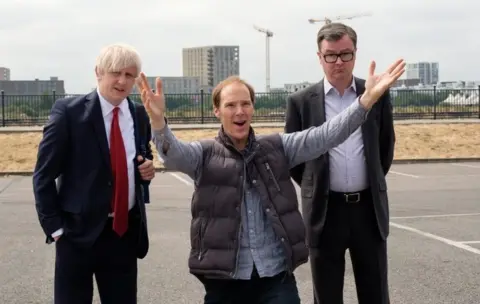 channel 4
channel 4Dominic Cummings has been portrayed as the brains behind Vote Leave's victory in the 2016 EU referendum. Benedict Cumberbatch even played him as a quirky near-genius in the Channel 4 drama Brexit: The Uncivil War, coming up with slogans like "Take back control" that struck a chord with millions of voters.
But, Mr Cummings tells the BBC that anyone who says they are sure, five years after the result, that Brexit is a good thing must "have a screw loose".
However, he adds: "Obviously I think Brexit was a good thing."
Mr Johnson has said that Brexit will allow the UK to "take back control of our laws and our destiny" and allow the country to seek trade deals with the wider world.
5) Carrie Symonds tried to influence Downing Street appointments
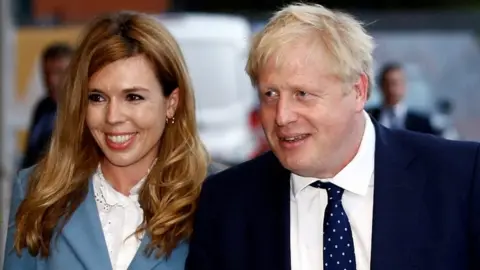 Reuters
ReutersIn the interview, Mr Cummings claims Carrie Symonds wanted to get rid of him and other former Vote Leave staff who were working in Downing Street.
Before the 2019 general election, he claims, Ms Symonds believed her fiancé needed Mr Cummings and the former Vote Leave team to win, but "as soon as the election was won" her view became "Why shouldn't it be me that's pulling the strings?"
"The situation we found ourselves in is that, within days, [we] were in a situation where the prime minister's girlfriend is trying to get rid of us and appoint complete clowns to certain key jobs," he says.
A Downing Street spokesperson says: "Political appointments are entirely made by the prime minister."
6) Cummings discussed getting rid of Boris Johnson
Within days of the Conservatives winning the 2019 general election, Mr Cummings says, he began talking to his allies within Downing Street about ousting Boris Johnson.
"We were already saying, 'By the summer either we'll all have gone from here, or we'll be in the process of trying to get rid of him and get someone else in as prime minister,'" he adds.
"He doesn't have a plan, he doesn't know how to be prime minister and we only got him in there because we had to solve a certain problem not because he was the right person to be running the country."
7) The PM hasn't been in touch lately
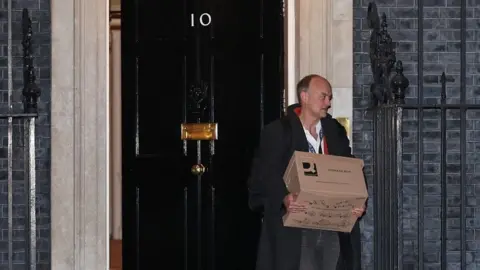 PA Media
PA MediaOnce Boris Johnson's most senior adviser - at the very heart of No 10 - Dominic Cummings says he hasn't spoken to his ex-boss since he quit Downing Street.
The PM, he adds, tried to get in touch by phone after he quit, but he didn't answer.
It does not "bother me one way or the other" whether they speak again, he claims.
8) Cummings doesn't cry over criticism
Portraying himself as someone who wanted to reform government and was opposed by the "establishment", Mr Cummings says he wasn't afraid to upset people to get things done.
People thought of him "generally as a nightmare", he says.
"If you are airing big difficult things, it's going to be upsetting for a lot of people... A lot of people have a pop at me, but you don't see me crying about it."
Mr Cummings - challenged repeatedly throughout the BBC interview to back up his version of events - says many of his claims will be corroborated if there is a public inquiry into the government's handling of the Covid crisis.
